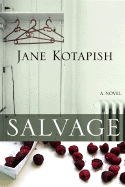
Nothing new can be said about mothers and daughters. Fortunately, the old can be said in a new way, which is what Jane F. Kotapish has done with this quirky and sometimes sad story.
 When the unnamed narrator was 10, her mother, Lois, was pregnant, and then one day she wasn't, taking to her darkened room for days with a hot water bottle. "I named my dead sister Nancy and talked to her in the privacy of my closet for eleven years." Nancy was ornery, furious over her death, and prone to plotting destruction. Lois divorces her husband, and she and the girl fall into "an easy tandem punctuated by loud but quickly passing storms." Lois often avoided arguments with her sarcastic little daughter by going to the kitchen, lighting a cigarette and riffling through her recipe card box, where "she found the answers to all of her parenting questions--and tragically, none of her cooking ones--in that box."
When the unnamed narrator was 10, her mother, Lois, was pregnant, and then one day she wasn't, taking to her darkened room for days with a hot water bottle. "I named my dead sister Nancy and talked to her in the privacy of my closet for eleven years." Nancy was ornery, furious over her death, and prone to plotting destruction. Lois divorces her husband, and she and the girl fall into "an easy tandem punctuated by loud but quickly passing storms." Lois often avoided arguments with her sarcastic little daughter by going to the kitchen, lighting a cigarette and riffling through her recipe card box, where "she found the answers to all of her parenting questions--and tragically, none of her cooking ones--in that box." The daughter moves to New York, leaving Nancy behind, and thrives, but "an uncouth conclusion" to her Manhattan story begins and ends on the F train platform. After the incident, she moves back to Virginia, where she buys an old Victorian house, because the back yard is lavish and reckless, filled with white violets and peonies, giant oaks, weeping willows, herbs; the day she views it, "the roses have completed a magnificent bloom and linger like drunk women at the end of a party, voluptuous past repair, faded, sick with their own perfume." She sees this house, "a play house filed with the ghosts of children and pies," as a place to banish her own ghosts. Here she reads old magazines while drinking white wine, then sleeping until noon. She is flirting with the possibility of going mad, but is still as close to happy as she has ever been. But soon after she moves into the dark green house, her mother begins talking to saints. "Cuthbert came by to see me on Tuesday," she says one day, at the house for tea. St. Cuthbert from her cardio funk class, who used to tend sheep, and now is a veterinarian. Or John, a wonderful fisherman, whom Lois met at the Audubon Society. The narrator decides her mother is nuts, until Lois starts to bring her saints by for lunch.
Salvage is a crazy, lush, tender story of two broken people, and the attempts they make to mend themselves. The narrator says, "I am remembering eleven years of my life that I now have the luxury of labeling as psychotic . . . I gave my irreplaceable girlhood away . . . I tiptoe in exquisitely tiny steps around the question: where was my mother all that time?" This is the kind of book you finish, tell everyone you know about it, and then realize you are ruined for anything else for a while. Sweet misery.--Marilyn Dahl

